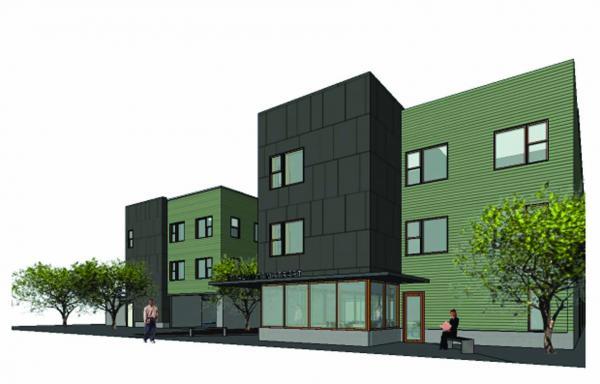September 28, 2016

A proposed three-story building to house formerly homeless people would rise from what is now a decrepit, nearly-abandoned warehouse at 123 Hamilton Street, as shown above. Photo courtesy Trinity Green Investments LLC
A proposal to build a housing complex at 123 Hamilton St. for formerly homeless people run by the Pine Street Inn came under scrutiny from neighbors at a city-led meeting on Tuesday night. The plan would raze a long-vacant warehouse, widely viewed as an eyesore on the mainly residential street, and create 52 units of living space for men and women over 55 years of age.
The Pine Street Inn says that the facility would be staffed at all times with social workers and managers from their agency and will meet a growing need to serve elders who are “aging in place” in other Pine Street-run properties.
The three-story building would be built and owned by Trinity Green, a private firm that also converted the former St. Peter’s convent building on Bowdoin Street— where Tuesday’s meeting was held. The complex at 307 Bowdoin Street is also owned by Trinity Green and leased to Pine Street Inn, which houses 32 people there. The building was repeatedly cited on Tuesday as a model for improving the neighborhood without disruption.
Indeed, even several neighbors who spoke against the 123 Hamilton proposal, citing concerns about overburdening the Bowdoin Street section of the city with too much low-income housing or people with addiction problems, heaped praise on Pine Street for their well-managed properties.
“We respect Pine Street Inn, “ said Carlos Castillo, a realtor who lives on Hamilton Street. “But we feel like we are being sandwiched in with all these Pine Street projects. It’s just not good.”
Castillo’s critique was echoed by at least five other residents who rose to express opposition to the proposal. Their concerns ranged from worries that the formerly homeless population would bring more poor people to an already poor neighborhood to those who suggested that the builders— who do not live in the city— might realize too much profit from the deal.
Several other people expressed enthusiasm for a proposal that would replace an unsightly, distressed corner of Hamilton Street and house needy people.
“That space has been empty for 20 plus years and its an eyesore,” said Eloisa Spinola-Depina. “We have a lot of homeless right here and they will benefit the community by housing homeless people.”
Spinola-Depina noted that she had no idea that the former St. Peter’s rectory was managed by Pine Street Inn— a fact she said pointed to the lack of negative impact.
Davida Andelman, a longtime activist who lives on Hamilton Street, said she and other nearby abutters support the proposal. So do as many as 16 nearby businesses that she’d visited and collected signatures of support from owners.
“Last year I turned 70. I see far too many people who would be classified as seniors who don’t have a place to live,” said Andelman. “There is support for this project in this community.”
Jan Griffin, an employee of Pine Street Inn, explained that the Hamilton facility would not be a shelter or a rooming house, but rather permanent housing for people who have been involved in Pine Street Inn programs, in some cases, for more than a decade.
“Our focus and growth over the last six to eight years has been a real push on housing,” said Griffin. “No more shelters. 123 Hamilton would be permanent housing.”
All residents, Griffin said, will pay rent and many will be relocated from other Pine Street properties that don’t have modern amenities that aging people need, most notably an elevator that will be a key feature of the Hamilton building. All residents are subject to background checks and — critically— the Pine Street Inn does not house sex offenders.
Another longtime resident, Ed Cook, said that the building would be a great improvement over what is currently on the site. But Cook said that the community needed more time to review the project and to garner more input from a larger group.
John Campbell, the project manager for the newly re-named Boston Planning and Development Agency (formerly the BRA), said that “it would not be a problem” to extend the public comment period for the proposal, which was due to expire on Oct. 7. Campbell said he thought a second community meeting would likely be needed.
Project Highlights— 123 Hamilton St.
• Lot contains 22,602 sq. ft with the current warehouse containing 17,900 sq. ft.
• Total of 52 units of housing, each between 300-400 sq ft in size with individual kitchens and bathrooms.
• The proposed building will create an additional 6,178 sq. ft of open space and green space.
Villages:
Topics:


